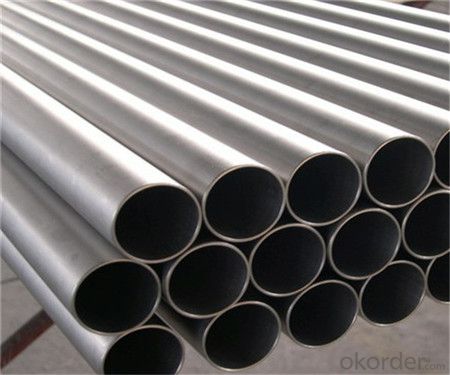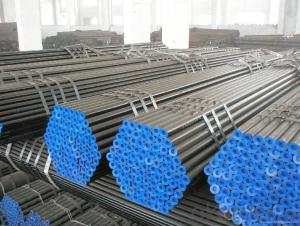API 5L/ ASTM A106-2006, ASTM A53-2007 Seamless Petrol Line Pipe Made in China from CNBM
- Loading Port:
- Tianjin
- Payment Terms:
- TT or LC
- Min Order Qty:
- 20 m.t.
- Supply Capability:
- 15000 m.t./month
OKorder Service Pledge
OKorder Financial Service
You Might Also Like
1、Structure of API 5L/ ASTM A106-2006, ASTM A53-2007 Seamless Petrol Line Pipe Made in China from CNBM:
Seamless pipe is formed by drawing a solid billet over a piercing rod to create the hollow shell. As the manufacturing process does not include any welding, seamless pipes are perceived to be stronger and more reliable. Historically seamless pipe was regarded as withstanding pressure better than other types, and was often more easily available than welded pipe.
2、Main Features of API 5L/ ASTM A106-2006, ASTM A53-2007 Seamless Petrol Line Pipe Made in China from CNBM:
• High manufacturing accuracy
• High strength
• Small inertia resistance
• Strong heat dissipation ability
• Good visual effect
• Reasonable price
3、API 5L/ ASTM A106-2006, ASTM A53-2007 Seamless Petrol Line Pipe Made in China from CNBM Specification:
Standard | GB, DIN, ASTM ASTM A106-2006, ASTM A53-2007 |
Grade | 10#-45#, 16Mn 10#, 20#, 45#, 16Mn |
Thickness | 8 - 33 mm |
Section Shape | Round |
Outer Diameter | 133 - 219 mm |
Place of Origin | Shandong, China (Mainland) |
Secondary Or Not | Non-secondary |
Application | Hydraulic Pipe |
Technique | Cold Drawn |
Certification | API |
Surface Treatment | factory state or painted black |
Special Pipe | API Pipe |
Alloy Or Not | Non-alloy |
Length | 5-12M |
Outer Diameter | 21.3-610mm |
Grade | 20#, 45#, Q345, API J55, API K55, API L80, API N80, API P110, A53B |
Standard | ASME, ASTM |
1) Material:20#(ASTM A 106/A53 GRB.API5LGRB,GB),45#,16Mn,10#.
2) Specification range:OD:21.3-610mm,WT:6-70mm,length:6-12m or according to the requirement of clients.
3) Excutive standards:GB,ASME API5L.ASTM A 106/A53,Despite of the above standards,we can also supply seamless steel pipe with standard of DIN,JIS,and so on,and also develop new products according to the requirements of our clients!
4) Surface:black lacquered,varnish coating or galvanized.
5) Ends:Beveled or square cut,plastic capped,painted.
6) Packing:bundles wrapped with strong steel strip,seaworthy packing.
4、Packaging & Delivery
Packaging Details: | seaworthy package,bundles wrapped with strong steel strip |
Delivery Detail: | 15-30days after received 30%TT |
5、FAQ of API 5L/ ASTM A106-2006, ASTM A53-2007 Seamless Petrol Line Pipe Made in China from CNBM:
①How is the quality of your products?
Our products are manufactured strictly according to national and internaional standard, and we take a test
on every pipe before delivered out. If you want see our quality certifications and all kinds of testing report, please just ask us for it.
Guaranteed: If products’ quality don’t accord to discription as we give or the promise before you place order, we promise 100% refund.
②How about price?
Yes, we are factory and be able to give you lowest price below market one, and we have a policy that “ for saving time and absolutely honest business attitude, we quote as lowest as possible for any customer, and discount can be given according to quantity”,if you like bargain and factory price is not low enough as you think, just don’t waste your time.Please trust the quotation we would give you, it is professional one.
③Why should you chose us?
Chose happens because of quality, then price, We can give you both.Additionally, we can also offer professional products inquiry, products knowledge train(for agents), smooth goods delivery, exellent customer solution proposals.Our service formula: good quality+good price+good service=customer’s trust
SGS test is available, customer inspection before shipping is welcome, third party inspection is no problem.
6.Images

- Q:Can steel pipes be used for underground water wells?
- Yes, steel pipes can be used for underground water wells. Steel pipes are often chosen for their durability and strength, which makes them suitable for withstanding the pressure and weight of the surrounding soil and water. They are commonly used in both residential and industrial applications for drilling and constructing water wells. However, it is important to consider certain factors such as the type and quality of the steel, as well as the presence of corrosive elements in the water, to ensure the longevity and reliability of the well system. Additionally, proper insulation and coating may be required to prevent corrosion and contamination of the underground water source.
- Q:Can steel pipes be used for underground compressed air pipelines?
- Yes, steel pipes can be used for underground compressed air pipelines. Steel pipes are commonly used for underground pipelines due to their strength and durability. They have the ability to withstand high pressure and can resist corrosion and other environmental factors. Steel pipes are also known for their long lifespan, making them a reliable choice for compressed air pipelines. However, it is important to ensure that the steel pipes are properly coated and protected to prevent any potential corrosion issues. Additionally, proper installation and maintenance of the pipelines are crucial to ensure their efficiency and safety.
- Q:What is the difference between steel pipes and cast iron soil pipes?
- Steel pipes and cast iron soil pipes differ in their composition and characteristics. Steel pipes are made of an alloy of iron and carbon, providing them with high strength and durability. They are commonly used for transporting fluids and gases, and are resistant to corrosion. On the other hand, cast iron soil pipes are made from molten iron that is poured into molds. They are primarily used for drainage and sewage systems due to their excellent soundproofing properties. Cast iron soil pipes are more resistant to fire and have a longer lifespan compared to steel pipes. Additionally, cast iron soil pipes are typically heavier and thicker than steel pipes, making them more suitable for underground installations. However, steel pipes are lighter and easier to handle, making them a preferred choice for above-ground applications. Ultimately, the choice between steel pipes and cast iron soil pipes depends on the specific requirements of the project, such as the intended use, location, and budget.
- Q:How are steel pipes connected or joined together?
- Steel pipes are typically connected or joined together using various methods such as welding, threading, flanges, or couplings.
- Q:What is the difference between steel pipes and concrete pipes?
- Steel pipes and concrete pipes differ in terms of their material composition and physical characteristics. Steel pipes are made from steel alloys, which make them strong, durable, and resistant to corrosion. They have high tensile strength, allowing them to withstand high-pressure applications. Steel pipes are commonly used in industries such as oil and gas, plumbing, and construction. On the other hand, concrete pipes are made from a mixture of cement, aggregates, and water. They are known for their exceptional compressive strength and durability. Concrete pipes are commonly used in sewage systems, drainage systems, and culverts. In terms of installation, steel pipes are lightweight and easy to handle, making them more convenient to transport and install. Concrete pipes, on the other hand, are heavier and require specialized equipment for installation. Additionally, steel pipes have a smooth internal surface, which allows for efficient flow of fluids or gases. Concrete pipes, however, have a rougher internal surface, which may cause more friction and result in reduced flow rates. Overall, the choice between steel pipes and concrete pipes depends on the specific requirements of the project, including factors such as application, budget, and durability needs.
- Q:What are the advantages of using steel pipes in industrial plants?
- There are several advantages of using steel pipes in industrial plants. Firstly, steel pipes are incredibly strong and durable, capable of withstanding high pressures and extreme temperatures, making them suitable for transporting various liquids and gases. Secondly, steel pipes have excellent resistance to corrosion, ensuring a longer lifespan and reduced maintenance costs. Additionally, steel pipes have a smooth interior surface, minimizing frictional resistance and allowing for efficient flow of materials. Lastly, steel pipes are highly versatile, with different sizes and thicknesses available, making them suitable for a wide range of applications in industrial plants.
- Q:What is the role of steel pipes in the aerospace industry?
- Steel pipes in the aerospace industry serve various critical roles, primarily in the construction of aircraft structures and engines. They are commonly used for fuel and hydraulic systems, as well as for carrying pressurized air and gases. Steel pipes provide strength, durability, and resistance to high temperatures and pressure, ensuring the safety and reliability of aerospace components. Additionally, they contribute to fuel efficiency by reducing weight and minimizing fuel leakage.
- Q:How are steel pipes used in the construction of dams?
- Steel pipes are commonly used in the construction of dams for various purposes. They are primarily used for the transportation of water within the dam structure, supplying water to turbines for hydroelectric power generation. Steel pipes are also used for drainage systems, allowing water to be discharged safely and efficiently. In addition, they are utilized for the construction of penstocks, which are large pipes that control the flow of water from the reservoir to the turbines. Overall, steel pipes play a crucial role in the infrastructure of dams, ensuring the efficient management and utilization of water resources.
- Q:What's wrong with the 3PP anticorrosive steel tube?
- That is, polypropylene corrosion resistant coating of steel pipe, the biggest feature of this anti-corrosion coating is good heat resistance.
- Q:Can steel pipes be used for oil wells?
- Yes, steel pipes can be used for oil wells. Steel pipes are commonly used in the oil and gas industry due to their strength, durability, and resistance to corrosion. They are able to withstand the high pressures and temperatures that are encountered in oil well drilling and production. Steel pipes are also able to transport oil efficiently and safely from the well to the surface, making them a preferred choice for oil well infrastructure. Additionally, steel pipes can be easily welded and threaded, allowing for easy installation and maintenance in oil well applications.
1. Manufacturer Overview |
|
|---|---|
| Location | |
| Year Established | |
| Annual Output Value | |
| Main Markets | |
| Company Certifications | |
2. Manufacturer Certificates |
|
|---|---|
| a) Certification Name | |
| Range | |
| Reference | |
| Validity Period | |
3. Manufacturer Capability |
|
|---|---|
| a)Trade Capacity | |
| Nearest Port | |
| Export Percentage | |
| No.of Employees in Trade Department | |
| Language Spoken: | |
| b)Factory Information | |
| Factory Size: | |
| No. of Production Lines | |
| Contract Manufacturing | |
| Product Price Range | |
Send your message to us
API 5L/ ASTM A106-2006, ASTM A53-2007 Seamless Petrol Line Pipe Made in China from CNBM
- Loading Port:
- Tianjin
- Payment Terms:
- TT or LC
- Min Order Qty:
- 20 m.t.
- Supply Capability:
- 15000 m.t./month
OKorder Service Pledge
OKorder Financial Service
Similar products
New products
Hot products
Related keywords





























